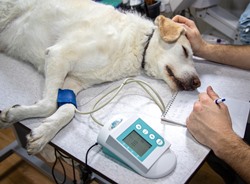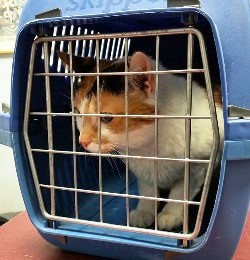Vet Technician College
How to Pick the Best One Near Yuma Arizona
 Fulfilling your long term dream of working with and helping animals by enrolling in a vet tech college near Yuma AZ might at first seem like a daunting undertaking. After all, you must find and enroll in a school that will deliver the appropriate training so that you can succeed as a vet tech. And in order to pick the right one you must evaluate and compare each of the schools you have placed on your short list. When checking out vet tech programs, many potential students begin by targeting those that are closest to their homes. When they have identified some area colleges, they find out which ones have the lowest tuition and focus on those. Although location and cost are significant concerns when evaluating vet tech schools, they are by no means the only important ones when making your assessments. Job placement and intership programs in addition to accreditation are just as important if not more so as cost and location. The main idea is that there are questions you should be asking the veterinary technician programs you are reviewing before you make an ultimate choice. We have presented several within this article in order to help get you started, but before we review them we'll talk about the different roles of vet techs and the training alternatives available.
Fulfilling your long term dream of working with and helping animals by enrolling in a vet tech college near Yuma AZ might at first seem like a daunting undertaking. After all, you must find and enroll in a school that will deliver the appropriate training so that you can succeed as a vet tech. And in order to pick the right one you must evaluate and compare each of the schools you have placed on your short list. When checking out vet tech programs, many potential students begin by targeting those that are closest to their homes. When they have identified some area colleges, they find out which ones have the lowest tuition and focus on those. Although location and cost are significant concerns when evaluating vet tech schools, they are by no means the only important ones when making your assessments. Job placement and intership programs in addition to accreditation are just as important if not more so as cost and location. The main idea is that there are questions you should be asking the veterinary technician programs you are reviewing before you make an ultimate choice. We have presented several within this article in order to help get you started, but before we review them we'll talk about the different roles of vet techs and the training alternatives available.
IT TAKES JUST A FEW MINUTES TO START YOUR VET TECH CAREER BELOW
Vet Technician Training Options

Among the first decisions that you will need to make is if you plan to train as a vet assistant, technician or technologist. Part of your decision might be based on the amount of time and money that you have to invest in your training, but the principal factor will most likely be which specialization appeals to you the most. What techs and assistants share in common is that they both work under the direct guidance of a practicing and licensed veterinarian. And even though there are many tasks that they can perform within the Yuma AZ veterinary practice or hospital, they can't prescribe medications, diagnose conditions, or perform surgeries. In those areas they can only furnish support to a licensed vet. There are technologists and technicians that work exclusive of the conventional vet practice, for example for animal shelters, zoos or law enforcement. Let's take a look at the duties and education prerequisites for each position.
- Vet Assistants in almost all cases will have gone through a structured training program, either as an apprentice or intern in a practice, or by completing a certificate program at a vocational school or community college. As the name implies, their job function is to assist the vets and vet techs in the completion of their duties. Normally they are not associated with more involved undertakings, for example assisting with surgeries. A few of their usual duties may include working at the front desk, preparing and cleaning examination rooms and equipment, or handling pets during examinations.
- Vet Technicians undergo more extensive training compared to assistants and usually acquire a 2 year Associate Degree, ideally from an American Veterinary Medical Association (AVMA) accredited program. They are in a sense the veterinary equivalent of medical nurses, since their basic job function is to assist veterinarians with diagnosing and treating animal patients. Where they vary from veterinary assistants is that they are engaged in more complex duties, for example assisting with surgical procedures or administering medication. All states presently require vet techs pass a credentialing exam for either licensing, registration or certification.
- Vet Technologists are similar to veterinary techs and essentially perform the same job functions. They are required to obtain a Bachelor's Degree in veterinary technology, which typically takes 4 years to complete. So the main distinction between a vet technician and a technologist is the technologist's higher level of education. But with an advanced degree comes more work opportunities, increased salaries and possible management positions. They are also mandated to pass a credentialing examination for either licensing, registration or certification.
Vet techs and technologists may specialize in areas such as internal medicine, anesthesia or urgent care. A number may obtain certification from the American Association for Laboratory Animal Science (AALAS) to work in Yuma AZ labs or research facilities also.
What to Ask Vet Tech Colleges
 At this point you should have selected which veterinary degree that you wish to attain, and if you prefer to study online or attend a college on campus. Since there are an abundance of veterinary community colleges, technical and vocational schools in the Yuma AZ area as well as across the Country, you need to ask some qualifying questions in order to narrow down your list of options. As we mentioned in our introduction, many future students start by focusing on location and the cost of tuition. But we have already mentioned other significant qualifiers, such as accreditation and internship programs. And naturally you need to enroll in a school that offers the specialty and degree that you want to earn. These and other factors are reviewed in the list of questions that you should ask the veterinary technician programs that you are considering.
At this point you should have selected which veterinary degree that you wish to attain, and if you prefer to study online or attend a college on campus. Since there are an abundance of veterinary community colleges, technical and vocational schools in the Yuma AZ area as well as across the Country, you need to ask some qualifying questions in order to narrow down your list of options. As we mentioned in our introduction, many future students start by focusing on location and the cost of tuition. But we have already mentioned other significant qualifiers, such as accreditation and internship programs. And naturally you need to enroll in a school that offers the specialty and degree that you want to earn. These and other factors are reviewed in the list of questions that you should ask the veterinary technician programs that you are considering.
Is the Veterinary College Accredited? It's essential that you make sure that the vet tech school you choose is accredited by a regional or national accrediting agency. As earlier discussed, among the most highly regarded is the American Veterinary Medical Association (AVMA). Vocational schools and colleges that are accredited by the AVMA have undergone a demanding review process that ensures you will obtain a quality education. Also, accreditation is necessary if you are applying for a student loan or financial aid, since a large number of programs are not obtainable for non-accredited schools. And finally, having a certificate or degree from an accredited college is frequently a requirement for employment for many Yuma AZ area vet clinics and hospitals.
What is the College's Reputation? The veterinary college or vocational school and program you choose must have an outstanding reputation within the veterinarian community. You can begin your due diligence by asking the schools you are interested in for testimonials from the employers in their job placement network. Other suggestions include looking on internet school ranking websites and contacting the school's accrediting agencies as well. You can ask the Arizona school licensing department if there have been any grievances or infractions concerning your targeted schools. As a final recommendation, get in touch with some Yuma AZ veterinary clinics that you might wish to work for after you go through your training. Ask what they think of your school choices. They may even suggest some programs not on your list.
Are there Internship Programs? The most effective means to obtain clinical hands on experience as a vet tech is to work in a professional environment. Find out if the programs you are reviewing have internship programs set up with Yuma AZ veterinarians, vet practices or hospitals. The majority of veterinary medicine programs mandate practical training and many provide it by way of internships. Not only will the experience be invaluable as far as the clinical training, but an internship may also help build relationships in the local veterinarian community and help in the search for a position after graduation.
Is there a Job Assistance Program? Finding a job after graduating from a veterinary technician college can be challenging without the assistance of a job placement program. First, find out what the graduation rates are for the colleges you are evaluating. A low rate could signify that the instructors were unqualified to teach the course of study or that a number of students were unhappy with the program and dropped out. Next, verify that the colleges have a job assistance program and find out what their placement rates are. A higher placement rate may mean that the school has an exceptional reputation within the Yuma AZ veterinary community and has a considerable network of contacts for student placements. A lower rate could indicate that the training is not highly thought of by employers or that the job assistance program is a failure at placing students.
How Big are the Classes? If the classes are larger sized, you may get little or no personalized instruction from the teachers. Request from the Yuma AZ programs you are researching what their class student to teacher ratios are. You might also want to attend some classes (if practical) to monitor the interaction between students and instructors. Ask for evaluations from students concerning the quality of instruction. Also, speak with the instructors and find out what their qualifications are as well as their approaches to teaching.
Where is the Campus Located? Of course, we already discussed location, but there are several more points to make on the subject. If you are planning to commute to your vet tech classes from your Yuma AZ home, you have to confirm that the driving time fits into your schedule. For example, driving during the weekend to check out the route won't be the same as the drive during rush hour traffic, especially if the college is located close by or within a large city. In addition, if you do decide to attend a college in another state or even outside of your County of residence, there may be higher tuition charges particularly for community and state colleges. On the other hand, attending classes online may be an alternative that will give you more flexibility and decrease the need for travel.
Is the Class Schedule Flexible? And last, it's essential that you determine if the veterinarian schools you are considering offer class times flexible enough to fit your schedule. For instance, a number of students continue working full time and can only attend classes on the weekends or in the evenings near Yuma AZ. Others may only be able to go to class in the morning or later in the afternoon. Make sure that the class times you require are offered before enrolling. In addition, find out if you can make-up classes that you might miss due to illness, work or family responsibilities. You might discover that an online program is the ideal way to fit your veterinary education into your hectic life.
Learn More About Becoming a Vet Tech in Yuma
Chosse the Right Yuma Veterinary Technologist School
Selecting the right veterinary technician program is a critical first step to beginning a rewarding career delivering treatment and care for pets and livestock. Potential students considering veterinary technician programs need to make their decision based on multiple key factors. Veterinary technicians and technologists are employed in vet clinics, animal hospitals and animal shelters. They usually handle administrative responsibilities and assist the veterinarian with the animal patients when needed. As we have covered, it's imperative that you pick a veterinary medicine program that is both accredited and has an outstanding reputation within the field. This goes for online vet tech programs as well. By asking the questions included in our checklist for assessing schools, you will be able to narrow down your choices so that you can make your final selection. And by picking the ideal college, you can accomplish your goal of becoming a veterinary technician in Yuma Arizona.
